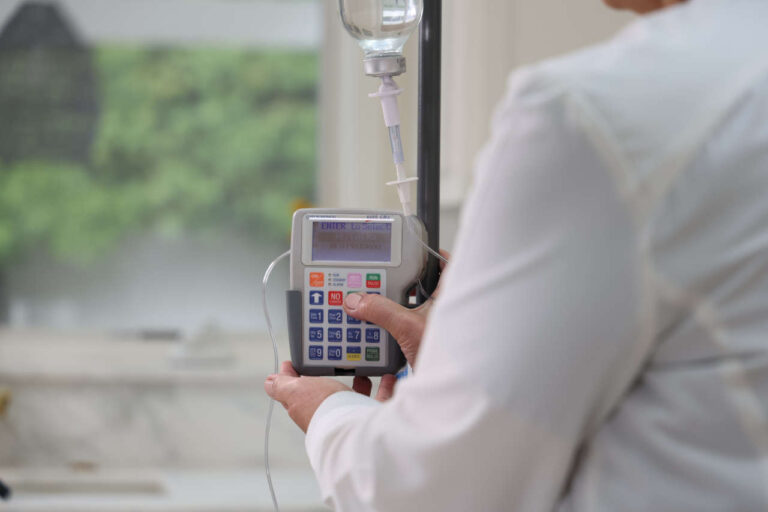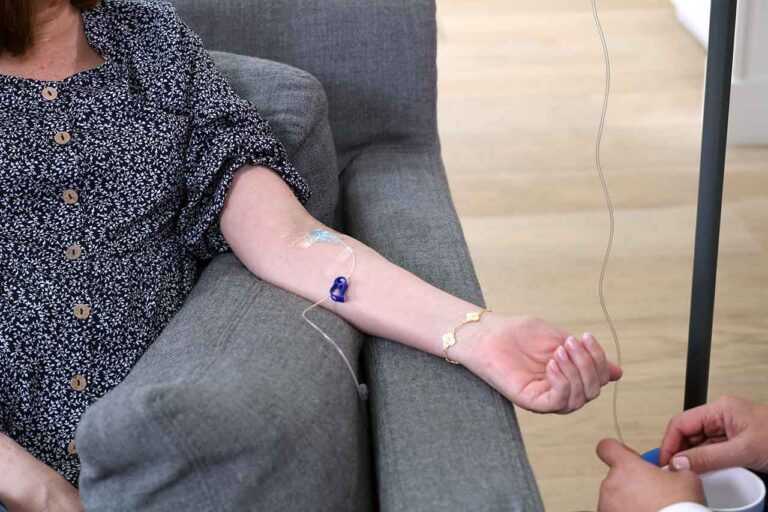
Although intravenous immunoglobulin (IVIG) therapy is considered an effective and safe medical intervention for the treatment of various immune-mediated disorders, it also comes with its associated risks. These risks can be mild and transient, consisting of flu-like symptoms, or they can cause serious health problems such as stroke, or severe allergic reactions.
Get IVIG Copay Assistance | IVIG Financial Assistance
If you are receiving IVIG treatment on a long-term basis, you must be aware of these risks to avoid complications.
In this article, we will briefly outline the potential risks associated with IVIG therapy and offer some preventive measures that can help reduce or actively manage the risks of IVIG therapy.
Basics of IVIG
IVIG therapy is primarily used to treat antibody deficiency in people who lack essential antibodies (also known as immunoglobulins) due to a medical condition, such as primary immunodeficiency disorder. The immunoglobulins provided through this therapy are made from thousands of healthy blood plasma donations and help your immune system fight off infections.
IVIG can also be used as an anti-inflammatory treatment. It can be helpful in reducing inflammation caused by the hyperactive immune system in autoimmune disorders.
In general, IVIG therapy has diverse modes of action, which makes this therapy a standard treatment for various immune-related disorders.
What Are the Risks of IVIG Therapy?
Like other medical treatments, IVIG possesses some risks that can pose serious health problems if not treated in a timely manner. Several clinical studies have reported the incidence of adverse events associated with the administration of IVIG. Some of the reported events are as follows:
Allergic Reactions
The risk of developing allergic reactions is common among patients receiving IVIG infusions. The allergic reactions can be associated with the components of IVIG used during infusions. Mild reactions may manifest as headaches, flu-like symptoms, urticaria (hives), fever, chills, chest tightness, back pain, nausea, angioedema (swelling of the lips/face), and diarrhea.
People may also experience severe allergic reactions like anaphylaxis, which is rare but can occur. For instance, in one case report, a 57-year-old woman with Crow-Fukase syndrome experienced anaphylactic shock immediately after the initiation of a second high-dose IVIG. This occurs due to the patient’s hypersensitivity to an IVIG product (e.g., polyethyleneglycol-treated gamma-globulin). Anaphylaxis is often characterized by severe swelling, often within minutes, of the face, lips, tongue, or throat, with difficulty breathing or shortness of breath. Additionally, some patients may experience abdominal pain, diarrhea, or vomiting and may exhibit a rapid heartbeat or dizziness.
Renal (Kidney) Impairment
Renal impairment is another risk associated with IVIG administration. It is a rare but serious life-threatening problem. In particular, older people who have pre-existing kidney problems, persistent diabetes, and dehydration are at higher risk of renal impairment following IVIG treatment. IVIG may affect the functions of the kidney, which may lead to kidney dysfunction or kidney damage in some individuals.
After immunoglobulin infusion begins, renal impairment usually appears within 10 days. Previous research has indicated that 8–15% of these people die; however, the majority of these patients have serious underlying medical issues, such as old age, a history of renal failure, or uncontrolled diabetes. As a result, more research is necessary to determine the reason for this outcome.
Thrombotic Events
Thrombotic events are a group of conditions that occur as a result of thrombosis (a blood clot in a vein, artery, or the heart). This blood clot can completely or partially block blood circulation, which can lead to thrombotic events like stroke, pulmonary embolism (blood clot in the lungs), or myocardial infarction (heart attack).
The risk of a thrombotic incidence increases during IVIG administration. For instance, a recent review highlighted 100 cases in which 80% of thrombotic events (such as stroke and myocardial infarction) occurred within 24 hours of completing IVIG infusion.
Some of the factors that typically contribute to a higher risk of thrombotic events during IVIG infusion include:
- Infusion of a large dose of IVIG (over 35 g of IVIG/day)
- Old age (over 45 years)
- People with prior/current thrombosis
- Hereditary diseases like ITP (immune thrombocytopenic purpura)
- History of atherosclerotic disease
- Elevated serum viscosity
Moreover, various studies have confirmed that patients who receive high doses of IVIG (over 35 g of IVIG/daily), have ITP or coronary heart disease, and are at higher risk of developing thrombotic events. Likewise, another case reported that a 43-year-old woman who received high-dose intravenous immune globulin for dermatomyositis experienced acute stroke due to thrombosis.
In general, thrombotic events can be triggered by various underlying mechanisms of blood formation. However, one factor, plasma viscosity, has proven more of a potential threat. Plasma viscosity, the thickness of the liquid part of blood, can be increased by IVIG treatments. A clinical investigation confirmed that IVIG treatment, especially the concentration of IgG, increases the serum viscosity across the treatment course and potentially triggers thrombotic events in patients.
Get IVIG Copay Assistance
Speak to a Specialist
Hemolysis and Neutropenia (Hematologic Disorders)
The risk of hemolysis (red blood cell destruction) and neutropenia (low white blood cells) are extremely low but can occur in patients receiving IVIG infusions. For example, IVIG-induced hemolysis is higher in patients with type A (65%) or AB (26%) blood. This can happen due to the presence of A and B isoagglutinin (anti-A and anti-B antibodies) in the IVIG product. Additionally, various other studies reported the association of IVIG with hemolysis and confirmed that IVIG is a causative factor of this condition.
In the case of neutropenia, the risk is higher in patients with neurological disorders.
Aseptic Meningitis
Aseptic meningitis is the inflammation of the brain’s protective covering called meninges. Several studies have reported that people with neurological disorders like Kawasaki disease develop IVIG-associated aseptic meningitis within 24 hours of treatment. The risk of aseptic meningitis is rare and mostly occurs in people with neurological disorders.
Infection Risk
IVIG products are prepared under a stringent quality control protocol, and the risk of getting blood-borne infection through IVIG infusions is extremely low.
IVIG, being a blood product, carries the potential danger of transmitting viral infectious agents such as hepatitis B, HIV, and others. There have only been a few documented incidences of hepatitis C transmission in the distant past.
How Can You Reduce the Risks of IVIG?
The following are some preventive measures that your healthcare provider will follow to minimize the risks associated with IVIG administration:
- Adequate monitoring and risk assessment: As IVIG poses some risk of adverse events, which could be serious and fatal, the medical information of every patient is obtained before scheduling the IVIG treatment course. This information includes the patient’s medical history, age, blood group, liver & kidney tests, existing medical conditions (e.g., coronary heart disease, stroke, or hypertension), and medication history.
- Slowing the rate of IVIG infusion: Since a rapid and high-dose IVIG infusion can increase the risk of thrombotic events, hemolysis, and renal dysfunction, slowing down the infusion rate can reduce the risks of IVIG. It is recommended to start the first IVIG infusion at a slow rate for the first 30 minutes and closely monitor the patients during and after IVIG infusions.
- Premedication and prehydration: Healthcare providers may administer some premedication like antihistamines (Benadryl), NSAIDs (Ibuprofen/Naproxen), or corticosteroids (prednisone, methylprednisolone) prior to IVIG infusion to reduce the severity and incidences associated with IVIG. Similarly, prehydration with normal saline help to reduce IVIG-induced risks such as headaches, thrombolysis, renal impairment, and hemolysis.
There are some other strategies that can help reduce the risks of IVIG. For instance, patients with thrombosis can use antithrombotic therapy, or patients with severely damaged renal function can have short-term renal replacement therapy before IVIG treatment.
REFERENCES:
- Guo, Y., Tian, X., Wang, X., & Xiao, Z. (2018). Adverse Effects of Immunoglobulin Therapy. Frontiers in Immunology, 9. https://doi.org/10.3389/fimmu.2018.01299
- Pierce, L., & Jain, N. (2003). Risks associated with the use of intravenous immunoglobulin. Transfusion Medicine Reviews, 17(4), 241-251. https://doi.org/10.1016/S0887-7963(03)00038-5
- Takahashi, T., Ono, S. I., Ogawa, K., Tamura, M., & Mizutani, T. (2003). A case of anaphylactoid shock occurring immediately after the initiation of a second intravenous administration of high-dose immunoglobulin (IVIg) in a patient with Crow-Fukase syndrome. Rinsho shinkeigaku= Clinical neurology, 43(6), 350-355. https://pubmed.ncbi.nlm.nih.gov/14503355/
- Orbach, H., Tishler, M., & Shoenfeld, Y. (2004). Intravenous immunoglobulin and the kidney—A two-edged sword. Seminars in Arthritis and Rheumatism, 34(3), 593-601. https://doi.org/10.1016/j.semarthrit.2004.06.003
- Funk, M. B., Gross, N., Gross, S., Hunfeld, A., Lohmann, A., Guenay, S., Hanschmann, K. M., & Keller-Stanislawski, B. (2013). Thromboembolic events associated with immunoglobulin treatment. Vox Sanguinis, 105(1), 54-64. https://doi.org/10.1111/vox.12025
- Rajabally, Y. A., & Kearney, D. A. (2011). Thromboembolic complications of intravenous immunoglobulin therapy in patients with neuropathy: A two-year study. Journal of the Neurological Sciences, 308(1-2), 124-127. https://doi.org/10.1016/j.jns.2011.05.035
- White, D. A., & Leonard, M. C. (2007). Acute stroke with high-dose intravenous immune globulin. American Journal of Health-System Pharmacy, 64(15), 1611–1614. https://doi.org/10.2146/ajhp060205
- Desborough, M. J., Miller, J., Thorpe, S. J., Murphy, M. F., & Misbah, S. A. (2014). Intravenous immunoglobulin-induced haemolysis: A case report and review of the literature. Transfusion Medicine, 24(4), 219-226. https://doi.org/10.1111/tme.12083
- Mohamed, Muhajir; Bates, G; Eastley, B (2013). Massive intravascular haemolysis after high dose intravenous immunoglobulin therapy. University Of Tasmania. Journal contribution. https://hdl.handle.net/102.100.100/541220














